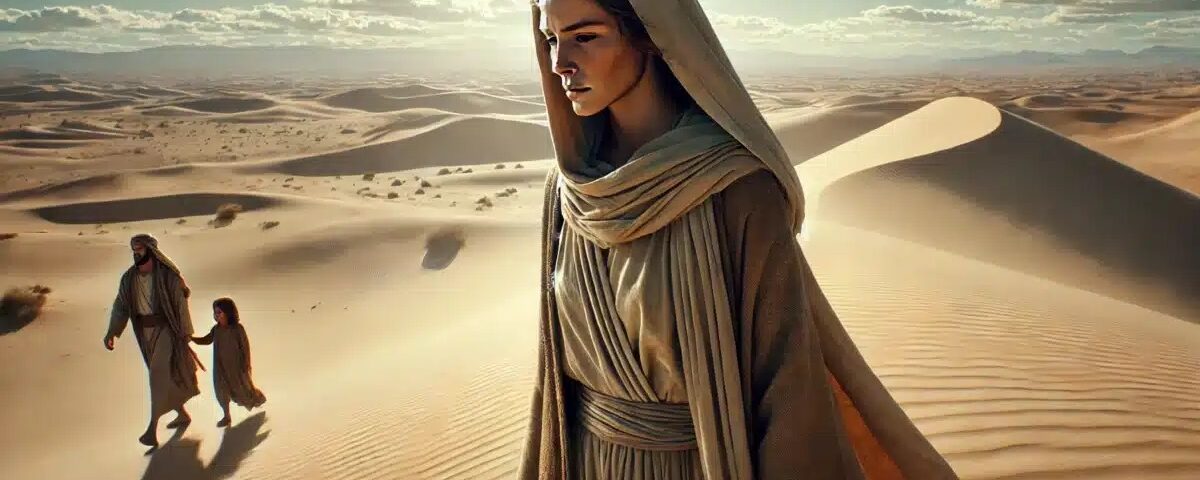Divine Retreat Centre UK – Official Website

Power of Tongue
November 15, 2024
Dewfall – 7
December 27, 202412 Unlikely Heroines of the Old Testament: Chapter 6 – Hagar
We are quite busy in our modern lives and have all sorts of gadgets to make life easy. The washing machine cleans our clothes, while the vacuum cleans the home. We now have air fryers and microwaves to cook food. Technology makes our lives comfortable. Yet amidst all this technology, we also rely on people – maids, gardeners, helpers, drivers, to name a few. We need these people from the lower rung of society to come into our homes to make life easier for us. And they do: they cook our meals, clean our homes, wash our clothes, water the garden, and even look after our children. But what do we do for them? Do we thank and appreciate them, or do we think that since they are paid, they owe us their work?
When I look at these men and women who come into our homes to work for us, I am reminded of a servant girl who worked in one such home, did her job, and did everything she was asked to do—even bearing a child for the family. The story of Hagar is a story of struggle and how God meets us in our circumstances. Yet most of the time, we have paid more attention to Abraham and Sarah and relegated Hagar to being the villain. However, Hagar’s life and story demonstrate how God comes to us in our darkest moments, irrespective of how messy our lives are.
Hagar was an Egyptian slave to Abraham and Sarah (cf. Genesis 16:1). As a slave, she represents the voice of those abused and abandoned, people who have been left to die. In the book of Genesis Chapter 15, God had promised Abram descendants as numerous as the stars (cf. Genesis 15:5). But Sarai and Abram were impatient and couldn’t wait for God to fulfill His promise. They decided to take matters into their own hands. Just like many of us do, they were not willing to wait for God’s redemption or blessing. While waiting, we often face taunts and insults, and we lose hope. Many childless couples today, struggling with similar pain, take routes like artificial insemination or IVF because they cannot see another way. Young men and women, impatient for marriage, may enter relationships hastily, rather than waiting for God’s chosen partner. Sarai and Abram struggled with similar impatience. They decided to act, and Sarai asked her husband Abram to take their slave girl Hagar as his wife (cf. Genesis 16:2). We aren’t told whether Abram protested or considered the consequences. The very same verse says, “Abram hearkened to the voice of Sarai.” Abram had intercourse with Hagar, and she conceived (cf. Genesis 16:4). In her pride of bearing her master’s heir, Hagar looked with contempt at Sarai. Sarai then regretted her plan and made life miserable for Hagar.
The pregnant Hagar, unable to bear Sarai’s cruelty, ran away into the wilderness, where she first encountered an angel of the Lord. Hagar fled from humiliation and cruelty, as so many of us do. Consider how we treat those who work in our homes. Do we treat them with dignity and respect, or do our actions make their lives unbearable, forcing them to leave? Even though Hagar ran away, God met her in the wilderness and assured her: “You shall bear a son; you shall call his name Ishmael; because the Lord has given heed to your affliction. He shall be a wild ass of a man, his hand against every man and every man’s hand against him; and he shall dwell over against all his kinsmen” (cf. Genesis 16:11-12). The Lord also assured Hagar that He would multiply her descendants. In that moment, Hagar named God as the God who sees me. Hagar is the only person in the Bible to name God. Truly, we may try to run from our problems, but we cannot escape the Lord. “Where can I go from your spirit? Or where can I flee from your presence?” (Ps 139:7). Many times, we trust in God to fix our problems, but His solution may be to ‘return and submit’ to the pain for a time. Hagar heeded the word of the Lord and returned.
In Genesis 16:15-16, we read: “Hagar bore Abram a son; and Abram called the name of his son, whom Hagar bore, Ishmael. Abram was eighty-six years old when Hagar bore Ishmael to Abram.” Later, God fulfilled His promise, and a son was born to Sarah, who was named Isaac. Abraham was one hundred years old at Isaac’s birth (cf. Genesis 21:5). God had promised Abraham a son when he was eighty-five, and He fulfilled His word fifteen years later. As Isaac grew, on the day of his weaning, Abraham organized a feast. Ishmael, who must have been in his teens, was playing with Isaac. When Sarah saw them playing, she asked Abraham to “cast out this slave woman with her son; for the son of this slave woman shall not be heir with my son Isaac” (Genesis 21:10). Though Abraham was distressed, he heeded God’s voice and sent Hagar and Ishmael away. Ishmael—a young man—was asked to leave with his mother. They wandered in the wilderness of Beersheba.
When the water she had with her ran out, Hagar became worried about her child’s welfare. Knowing that food and water were unavailable in the desert, she resigned herself to death. Unable to see her son die, she left him under a bush and moved a distance away. The child cried, and the Lord heard his cry. “In my distress, I called upon the Lord and cried out to my God; He heard my voice from His temple, and my cry came before Him, even to His ears” (Ps 18:6). God came to Hagar a second time and said: “Fear not; for God has heard the voice of the lad where he is.” Then God opened her eyes, and she saw a well of water. She went, filled her skin with water, and gave the boy a drink (cf. Genesis 21:19).
And God was with Ishmael. He grew up, lived in the wilderness, and became an expert with the bow. His mother found him a wife from Egypt (cf. Genesis 21:20-21). God was with Ishmael, just as He is with prophets, apostles, and all of us. Hagar met God during her pain and abandonment. A foreign woman, living among foreign people, with no power, met God and was the only woman to name Him. Through her pain and struggles, God blessed her and fulfilled His promise.
Lessons from Hagar
- Even in moments of despair and struggle, call out to God, and He will come to you.
- Hagar, like Abraham and Sarah, is a model of faith. She shows us where to find God in our darkest moments.
- God never forsakes us. He accompanies us in the wilderness of our lives, of our mission, of our failures, and beyond.




